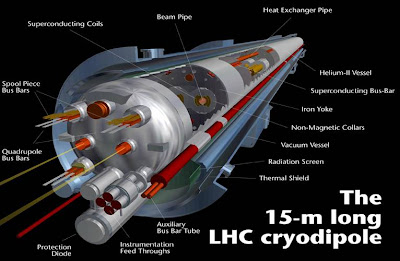In what is probably the biggest physics experiment in history, today marks the first successful test of the Large Hadron Collidor in Geneva by sending a beam of protons through the the entire underground ring that makes up the world’s largest particle collider. The beam sent through travels through the 17 mile underground ring and nearly the speed of light and can make 11,000 laps through the tube every second.

Officials with CERN (European Organization for Nuclear Research) dubbed the test a success today and the next step will be to send a beam of protons through the tunnel in the opposite direction. Today’s beam went clockwise and the next trial will be to send the beam counter-clockwise.
If successful then the team will be able to work towards the ultimate goal of sending protons through the tunnel in both directions at the same time, having them collide to simulate what may have happened immediately after the “big bang”, which is theorized to have created the universe.
It seems that not everyone is as excited as the world-wide group of scientists involved in this experiment with successful tests. Some skeptics argue that the collision of particles in the collider could cause micro black-holes with strong gravitational pulls and potentially wreak havoc on the planet.
The Large Hadron Collider is still about a year away from operation at full power and could eventually lead to more information about dark matter and could even reveal new dimensions of space and time where previous smaller colliders could not. via

Officials with CERN (European Organization for Nuclear Research) dubbed the test a success today and the next step will be to send a beam of protons through the tunnel in the opposite direction. Today’s beam went clockwise and the next trial will be to send the beam counter-clockwise.
If successful then the team will be able to work towards the ultimate goal of sending protons through the tunnel in both directions at the same time, having them collide to simulate what may have happened immediately after the “big bang”, which is theorized to have created the universe.
It seems that not everyone is as excited as the world-wide group of scientists involved in this experiment with successful tests. Some skeptics argue that the collision of particles in the collider could cause micro black-holes with strong gravitational pulls and potentially wreak havoc on the planet.
The Large Hadron Collider is still about a year away from operation at full power and could eventually lead to more information about dark matter and could even reveal new dimensions of space and time where previous smaller colliders could not. via
CERN LHC TEST
end of the world?, the Large Hadron Collider ( LHC )
CERN LHC Test 9th September 2008
 Reviewed by blogger
on
5:59 AM
Rating:
Reviewed by blogger
on
5:59 AM
Rating:
 Reviewed by blogger
on
5:59 AM
Rating:
Reviewed by blogger
on
5:59 AM
Rating:

![Constant Garden Desktop Audio[Design Concept] Constant Garden Desktop Audio[Design Concept]](https://blogger.googleusercontent.com/img/b/R29vZ2xl/AVvXsEi9P9NYtVqLQOBOvNze-fzp4VFZ_bzH6JqecqfkCVMB4PU5qHSZ7PEwhr9JtGJbDmTqWB5Nvkd13D1LkQIPYSG3b9g1ErqUXtA8xkBrqXetfMcWM7eVtyIegDtR4iY2YS8NaSlgs8W3jKA/s72-c/constgard0.jpg)













No comments:
Post a Comment